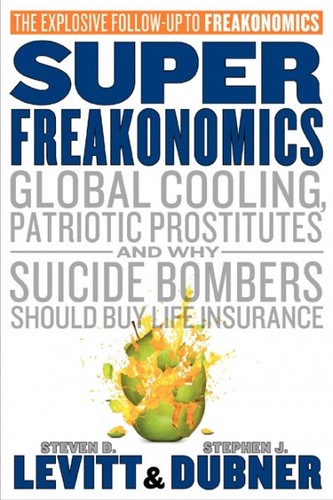"Four years in the making, SuperFreakonomics asks not only the tough questions, but the unexpected ones: What's more dangerous, driving drunk or walking drunk? Why is chemotherapy prescribed so often if it's so ineffective? Can a sex change boost your salary?
SuperFreakonomics challenges the way we think all over again, exploring the hidden side of everything with such questions as:
How is a street prostitute like a department-store Santa?
Why are doctors so bad at washing their hands?
How much good do car seats do?
What's the best way to catch a terrorist?
Did TV cause a rise in crime?
What do hurricanes, heart attacks, and highway deaths have in common?
Are people hard-wired for altruism or selfishness?
Can eating kangaroo save the planet?
Which adds more value: a pimp or a Realtor?
Levitt and Dubner mix smart thinking and great storytelling like no one else, whether investigating a solution to global warming or explaining why the price of oral sex has fallen so drastically. By examining how people respond to incentives, they show the world for what it really is – good, bad, ugly, and, in the final analysis, super freaky.
Freakonomics has been imitated many times over – but only now, with SuperFreakonomics, has it met its match."
I couldn't resist reading the sequel to Freakonomics, and this doesn't need you to read the first one because both are a completely jumbled analysis of random things. I don't feel like this one was quite as good as the first one--a little more random, a little less organized, a tiny bit more out there. I feel like it could have benefitted even from more broken-down chapters or headers; as is, the random interjections were just a bit hard to keep track of. And don't get me wrong, there was still a lot of really interesting stuff in there, but there were also a couple parts that had me skeptical. I get that most of their job is essentially turning conventional knowledge on its head, but a few cases--notably the global warming and chemo chapters--had me really wanting to get some second opinions and extra sources. For the most part, though, the subjects were as entertaining and thought-provoking as ever. I'd probably recommend reading it, and even if you don't want to read the whole thing, read the epilogue. It's one of the truly greatest things about the book. I'm serious: cappuccian capitalism. It's worth it, dude. Anyway, the book's at Kettleson but you'll have to pick it up in a month when they reopen. Ah well. Absence makes the heart grow fonder, and all that. Ciao!

No comments:
Post a Comment